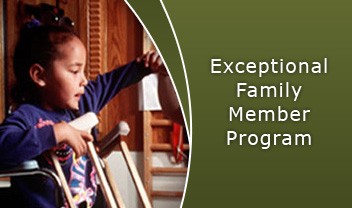The Exceptional Family Member Program allows the military to match the Family members' special needs with the gaining command's available medical and educational resources.
If services and providers are not available in the gaining command, military personnel may re-look assignment alternatives.
In order, however, for military personnel to accurately make assignments, Soldiers must ensure that their Family member's EFMP enrollment is current within at least three years of the last update initial enrollment or when medical or educational changes occur.
Medical enrollment is completed by the Family member's physician and educational enrollment is completed either by the school or early intervention service provider.
EFMP is referred to as an ''umbrella" program because it requires the collaboration of many components, such as, but not limited to, medical, military personnel, housing, Child, Youth, and School Service programs, JBM-HH Army Community Service; and community recreation for optimum special needs service.
Once the assignment is made, Families need to know that the military community at the gaining command will be able to support their needs. Families often confuse EFMP Family support and medical roles. ACS assists Families navigate through what can be a very complex maze of services and link Families to local, State and National resources, such as respite care, education and support groups, that provide medical and educational continuity. ACS provides information and referrals based on Family need during all phases of relocation and during tour of duty.
The medical EFMP component is responsible for enrollment and overseas Family member screening.
Once the medical enrollment (DD Form 2792) and or educational enrollment (DD Form 2792-1) are completed by the attending physicians, educators or early intervention specialists, Families hand carry the documents to their Army medical treatment facility's (MTF) EFMP office where the forms are forwarded to the major medical command for coding and transmitted to Human Resources Command.
The coded data can then be sent to the gaining command for service availability determination. ''A current enrollment prevents Families from relocating to an area that cannot support their documented special needs," said Marcia O'Connor, ACS EFMP manager.
A Soldier's assignment may be denied if there are inadequate special needs resources in the nominative assignment area, commented Eloise Head, Rader Clinic's EFMP case coordinator. It is this reason why a current and accurate enrollment is critical in assignment coordination.
Making the right assignment the first time not only prevents the early return of Family members and additional relocation costs, but enhances readiness. If the special need no longer exists and can be officially documented on the EFMP enrollment forms, a disenrollment may occur; however, the gaining command will make the final determination as to whether Family members accompany the sponsor. Soldiers may perceive these monitoring procedures as road blocks to assignments, but the challenges that ensue when services cannot be provided far outweigh changing an assignment.
Both O'Connor and Head are available to respond to enrollment queries and can be reached at 703-696-8467 or 703-696-7965 respectively. Overseas screening appointments are scheduled only by Head or at other Army MTF EFMP offices. An Army EFMP enrollment and overseas screening class will be offered at the ACS, 201 Custer Road, Fort Myer, March 29 from 11 a.m. to 1 p.m. Reservations are required by calling 703- 696-8467.


Social Sharing